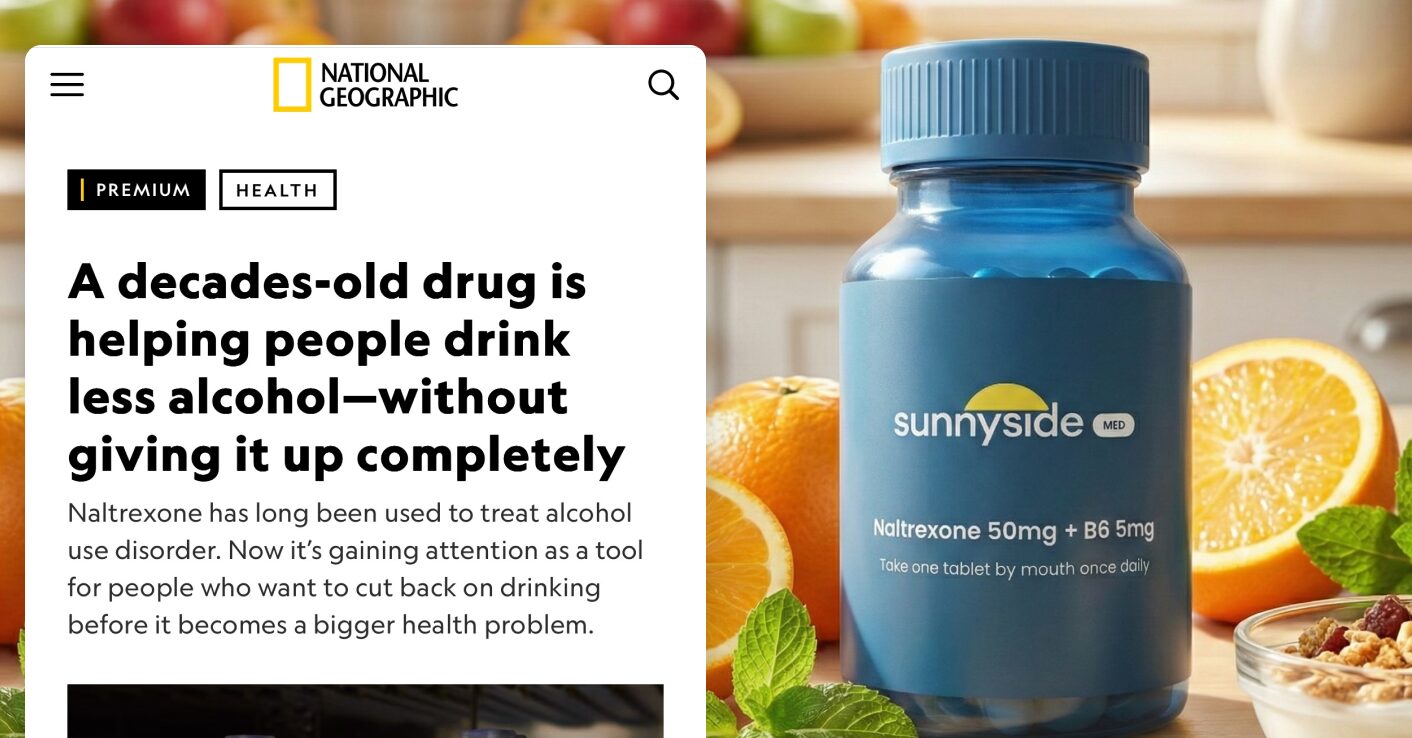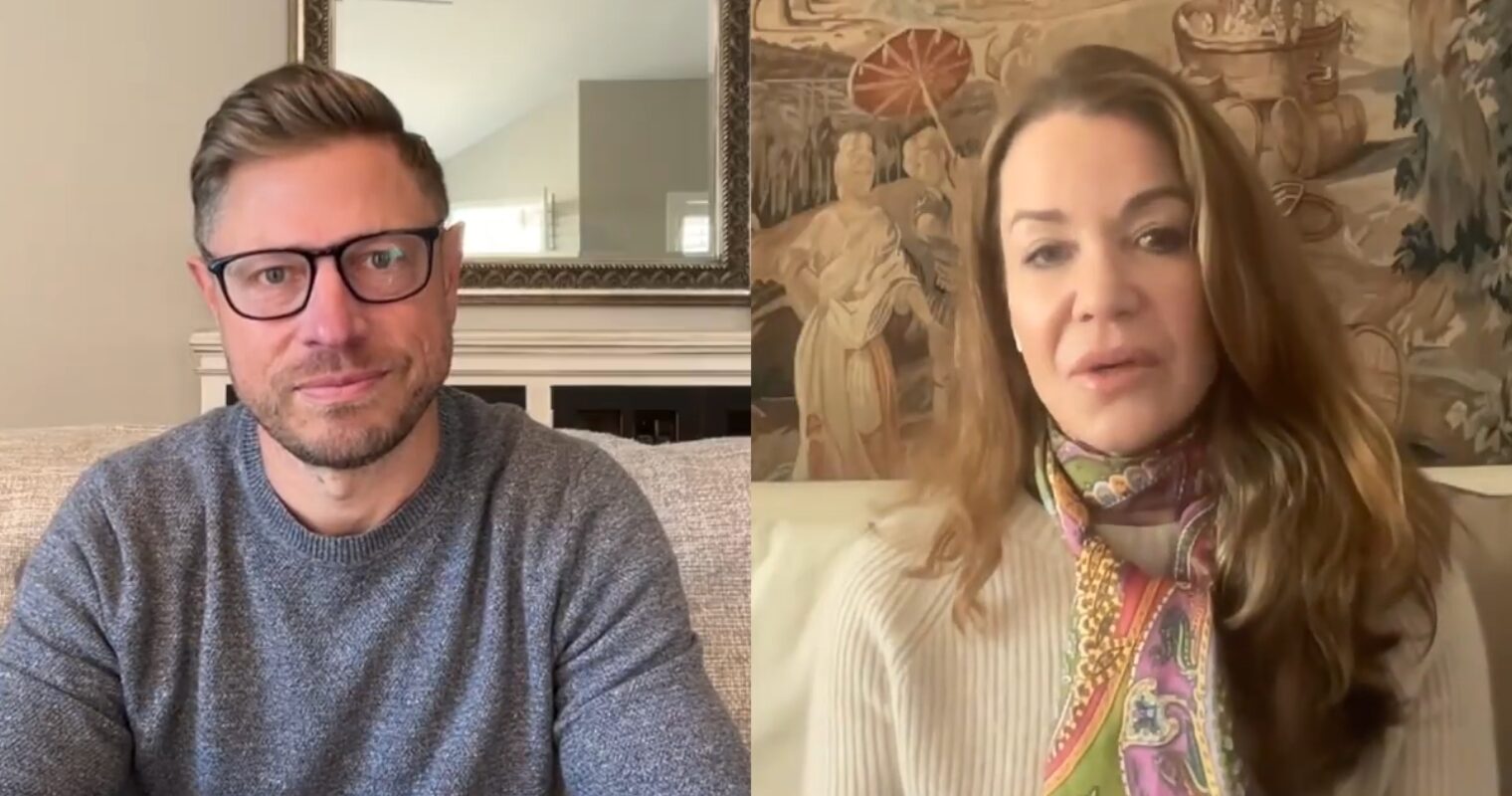Last Updated on May 15, 2023
Health and wellness is dependent on a good night’s sleep just as much as exercising and eating healthy foods. But people who struggle to reach their health and wellness goals sometimes overlook a key culprit: their nightly drink (or drinks).
The tradition of drinking alcohol before bed is so embedded in our culture that it has its own name: a nightcap. Alcohol is a sedative so it’s easy to get in the routine of having a glass of wine or splash of bourbon as a way to wind down before bedtime. But there are notable downsides. Studies show drinking alcohol can greatly impact your quality of sleep – and hinder other wellness goals in the process. At Sunnyside, many of our discussions with members involve educating them about alcohol and sleep – and then supporting them in their efforts to meaningfully change their habits.
How does alcohol affect sleep?
Although alcohol can sometimes help you to fall asleep, deep sleep is interrupted as alcohol begins to metabolize in your body. A typical sleep cycle consists of four stages that repeat throughout the night: three NREM (non-rapid eye movement) cycles and one REM (rapid eye movement). During the REM sleep cycle your brain becomes more active, your body becomes more relaxed and you’re more likely to dream. According to the Sleep Foundation, there is a connection between alcohol and REM sleep. Drinking alcohol before bed can cause you to fall asleep more quickly, resulting in more NREM sleep and less REM sleep. The disruption of the length of your sleep cycles can cause intense dreams and nightmares, and increase the risk of sleep apnea and even sleepwalking, according to the Cleveland Clinic. In addition, a Sleep Foundation study found that low amounts of alcohol (fewer than two servings per day for men or one serving per day for women) decrease sleep quality by 9.3%, while high amounts of alcohol (more than two servings per day for men or one serving per day for women) decrease sleep quality by 39.2%
Disrupted Sleep = Disrupted Next Day
Alcohol and sleep are not ideal bedfellows for many people. Imbibing alcohol before bed can increase your average sleeping heart rate. That’s because your liver is metabolizing alcohol and your body is producing cortisol. The alcohol is forcing your heart to beat an extra 3,000 times during the night, which means you get lower sleep quality – and a more prolonged recovery from drinking.
A night of alcohol-induced poor sleep can kickstart a cycle of drinking caffeine in the morning and throughout the day to help you stay alert. What can follow? A feeling of wanting alcohol again at night to help you fall asleep. The issue is that the drink or drinks that aid you in going to sleep will not ultimately help you enjoy restorative and restful sleep. Sometimes people combine sleeping pills and alcohol to help them stay asleep, but this can be a very dangerous cocktail causing impaired judgment, slow or labored breathing, memory issues and other serious problems.
How Sunnyside Can Help You Improve Your Sleep
Sunnyside is a drink tracking app and personalized service that can help you set goals to cut back your drinking by creating a customized plan that fits your lifestyle and unique objectives. We help members plan their drinking, track their drink intake, and generally be more mindful about how much they drink – and when they drink. In regard to alcohol and sleep, we can help you to:
- Drink less. Just like you track your steps and what you eat, Sunnyside makes it easy to set goals such as cutting back on nightcaps by tracking your drinks, making it easy to change your habits long term.
- Make a plan. In just a few minutes you can complete a diagnostic assessment, including your demographics, drinking habits and goals. Based on your responses, Sunnyside will generate a customized plan, tailored to helping you achieve your wellness goals, including getting more restful sleep.
- Add in “dry days.” Each week you can allocate a target number of drinks and also make a plan for “dry days” – days in which you’ll drink no alcohol. Each day without a drink equals one uninterrupted night of sleep. That means no more waking up in the middle of the night to use the bathroom. No more insomnia. No more feelings of lethargy or fogginess the next day.
- Stay motivated. Many people do well throughout the day but become less diligent about their eating and drinking goals come nightfall. Weekly planning and goal setting, along with daily drink tracking, has been proven helpful in reaching goals. Tracking creates conscious interference to those old nighttime routines, and our real-time feedback provide immediate motivation and support.
- Measure your progress. As you use Sunnyside over time, you’ll be able to visualize the impact that your healthier drinking habits have on your sleep, giving you additional motivation and validation to continue your progress. Armed with this real knowledge, you may find that you start to prioritize a healthy night’s sleep over imbibing.
Prioritizing Great Sleep Over Alcohol is a Lifestyle Choice
After working with thousands of members at Sunnyside, we’ve learned that many people have been making that nightcap a part of their routine for years. It can become so ingrained in us that we actually start to assume that our lower quality sleep, exhaustion the next day, and occasional hangover is normal. We’re not being judgmental as relaxing with a drink at the end of the day is common, and often fun.
But at Sunnyside we ask you to consider what adding a couple dry days into your week would do for you. We work with you to gradually modify your drinking habits until it feels comfortable for you. The results are often profound for our members, giving them a new outlook on what healthy, rested mornings can feel like.
This change in routine can snowball into other areas of the day, leading to less anxiety, a higher level of focus and motivation, and generally more happiness. The ultimate result is often a refocus on high-quality sleep over almost everything else. And to maximize great sleep, planning for dry days throughout the week becomes a top priority.
Here are some things our members have said regarding their sleep after using Sunnyside:
- “I have been sleeping much deeper after dry days. I’m hoping to increase dry days to three next week.”
- “Having dry days helps me to track how drinks affect my sleep patterns.”
- “I’ve been sleeping better and waking up at a much more normal time.”
- “I really have seen improvement in quantity and quality of sleep and haven’t had any sort of hangover type effects in 2 months!”
- “I absolutely love this program! It’s realistic and non-judgmental. I’ve already started sleeping and feeling better. Thank you so much.”
High-quality sleep is intrinsically tied to your health, happiness, and wellness. If it’s been a while since you’ve prioritized this aspect of your life, consider cutting back on your drinking, as well as embracing the other great tips below.
Additional Tips for High-Quality Shut-Eye
To optimize your health and wellness, consider these tips as ways to sleep tight:
- Don’t snack heavily before bed. Heartburn and indigestion can make it difficult to fall – and stay – asleep.
- Get adequate exercise on a frequent basis. Regular exercise can help you fall asleep more quickly and get better quality of sleep.
- Reduce screen time before bed. The light from electronic devices can suppress melatonin production, making you feel more awake.
- Limit caffeine late in the day. Although caffeine is quickly absorbed by the body, it’s a stimulant with a long half-life. According to the Sleep Foundation, 50% of caffeine consumed is still present in the body four to six hours later.
- Develop sleep routines and go to bed around the same time each night. A regular sleep schedule helps maintain the timing of your body’s internal clock.
- Begin a mindful meditation practice before bed. According to Healthline, studies show that meditation with controlled breathing may help lower the heart right, decrease blood pressure, and increase melatonin and serotonin levels.
- Cut off alcohol earlier in the night. Whether you’re socializing or having a nightcap at home, aim to have your last drink at least one hour before hitting the sack. In general, one serving of alcohol takes one hour to metabolize. So, the more you drink, the longer it’s going to take (and the worse your sleep will likely be). Consider switching to water for your last drink or two.
- Examine the roots of your routines with alcohol and sleep. If you’re drinking at night to calm your nerves and cope with anxiety, consider consulting a therapist.
Cutting back on alcohol is one of the easiest paths to a better night’s sleep. And better sleep means better health and wellness overall. If your nightcap has helped you fall asleep, know that your body will need some time to adjust. That’s to be expected. But once you get in the habit of falling asleep without the aid of alcohol, you’ll quickly begin to notice the benefits of longer, deeper sleeps. And the more you work to achieve your alcohol and sleep goals, the better you will feel and the more well-rested you’ll be as you work your unique plan.
Ready to reduce your drinking by 30% in 30 days leading to better sleep? Sign up for a 15-day free trial of Sunnyside now!




